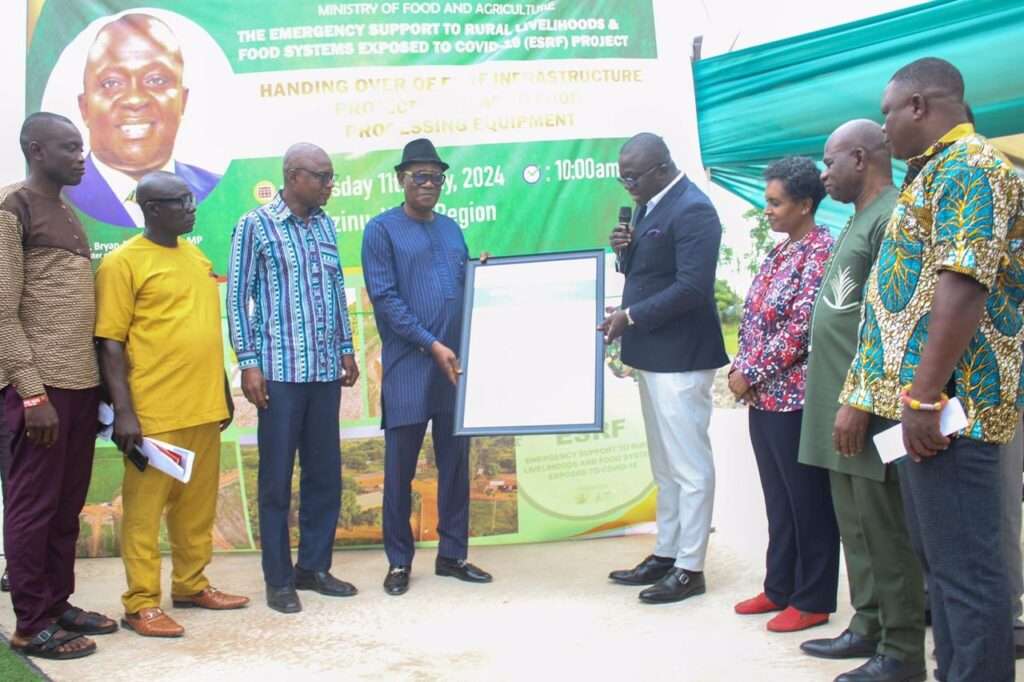In a significant milestone for Ghana’s agricultural sector, the Ministry of Food and Agriculture, in collaboration with the International Fund for Agricultural Development (IFAD), handed over essential infrastructure projects to beneficiary communities across the country.
The ceremony, held in Tordzinu, Volta Region, was part of the Emergency Support to Rural Livelihoods and Food Systems Exposed to COVID-19 (ESRF) Project. This initiative, launched by the Government of Ghana in response to the COVID-19 pandemic, aims to bolster food security and support the agricultural sector.
The Minister of Food and Agriculture, Dr. Bryan Acheampong, highlighted the project’s achievements over the past three years.
“The ESRF project has implemented various interventions over the past three years, including providing Personal Protective Equipment to 26,700 supply chain actors, fertilizers and improved seeds to 24,782 smallholder farmers, cash transfers to 5,000 vulnerable households, training for 1,000 smallholder farmers, and provision of small-scale food processing equipment to 5,500 farmers.”
Dr. Bryan Acheampong, Minister of Food and Agriculture
Dr. Acheampong emphasized the project’s success in constructing farm tracks, water harvesting facilities, drying platforms, and boreholes in various regions. These infrastructure projects aim to enhance market access for over 5,500 residents in surrounding communities and provide potable water, addressing critical needs in rural areas.
“The ESRF project has made substantial contributions to our agricultural sector and food security. The provision of PPE, fertilizers, improved seeds, and training to thousands of farmers is a testament to our commitment to supporting smallholder farmers and vulnerable households.”
Dr. Bryan Acheampong, Minister of Food and Agriculture
Dr. Acheampong expressed gratitude to all stakeholders involved, particularly commending the Country Director of IFAD for her guidance and cooperation throughout the project’s implementation.
The ESRF project, initiated in response to the COVID-19 pandemic, was designed to mitigate the pandemic’s adverse effects on Ghana’s rural livelihoods and food systems.
The collaboration between the Ministry of Food and Agriculture and IFAD has been pivotal in ensuring the project’s success. The concerted efforts of project managers, beneficiary communities, and individuals have been crucial in achieving sustainability and ownership of the projects.
The handing-over ceremony in Tordzinu was a testament to the government’s commitment to empowering smallholder farmers and enhancing food security in Ghana. The ESRF project’s interventions have significantly improved the lives of beneficiaries, contributing to the overall growth of the agricultural sector.
The provision of PPE, fertilizers, improved seeds, and small-scale food processing equipment has bolstered the capacity of smallholder farmers, enabling them to increase productivity and resilience.
Impact on Beneficiary Communities

One of the beneficiaries, Akosua Mensah, a smallholder farmer from the Ashanti Region, expressed her gratitude for the support received through the ESRF project.
“The fertilizers and improved seeds have transformed my farming activities. I can now produce more crops and provide for my family. The training sessions have also equipped me with valuable knowledge of modern farming techniques.”
Akosua Mensah, a smallholder farmer
The construction of farm tracks, water harvesting facilities, drying platforms, and boreholes has been instrumental in enhancing market access and providing potable water in rural communities.
The farm tracks have improved transportation, allowing farmers to transport their produce to markets more efficiently. Water harvesting facilities and boreholes have addressed the pressing need for reliable water sources, particularly in regions prone to water scarcity.
The ESRF project’s impact extends beyond immediate beneficiaries. The project contributes to the broader goals of poverty reduction and sustainable development by improving food security and supporting rural livelihoods.
The collaboration between the Ministry of Food and Agriculture and IFAD exemplifies the power of partnerships in achieving meaningful and lasting change.
The Minister’s remarks underscored the government’s dedication to fostering a resilient and sustainable agricultural sector.
“Our efforts to support smallholder farmers and enhance food security are part of a broader vision for a prosperous and self-sufficient Ghana. The ESRF project’s success is a testament to what we can achieve through collaboration and commitment.”
Dr. Bryan Acheampong, Minister of Food and Agriculture
As the ESRF project transitions from implementation to sustainability, the Ministry of Food and Agriculture and IFAD will continue to work closely with beneficiary communities to ensure the long-term benefits of the infrastructure projects.
The commitment to empowering smallholder farmers and improving food security remains unwavering, as Ghana strives to build a resilient agricultural sector capable of withstanding future challenges.
The handing-over ceremony in Tordzinu was not just a celebration of completed projects but a reaffirmation of the government’s pledge to support its farmers and ensure food security for all Ghanaians. The ESRF project’s success story serves as an inspiration for future initiatives aimed at transforming Ghana’s agricultural landscape and improving the lives of its people.
READ ALSO: Kofi Karikari Outlines 3 Important Things Bachelors Should Consider Before Marriage





















